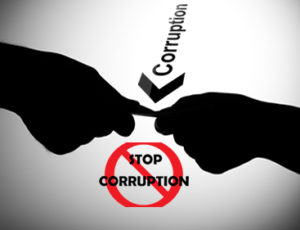Ghana media urged to sustain conversations against corruption
 Ms Josephine Nkrumah, Chairperson, the National Commission for Civic Education (NCCE), on Tuesday urged the media to sustain conversations against corruption and environmental degradation.
Ms Josephine Nkrumah, Chairperson, the National Commission for Civic Education (NCCE), on Tuesday urged the media to sustain conversations against corruption and environmental degradation.
She said the way media houses addressed issues as and when they come up would not help the fight against corruption and protection of the environment.
“The media should dedicate time to address such issues till set objectives of the nation’s constitution are achieved,” Ms Nkrumah said at the Commission’s “2020 Media Advocacy Workshop-Southern Zone” in Accra.
The workshop was on the theme: “Effective Public Education on Environmental Governance and Amendment of Relevant Constitutional Provision in Relation to Anti-Corruption Laws: The Role of the Media.”
She said the NCCE, Civil Society, and its stakeholders cannot win the fight alone but required collaboration with the media to reach the populace with the needed education and information.
Ms Nkrumah said the media as a watchdog should ensure that the objectives regarding corruption and the environment as stipulated in the 1992 constitution was adhered to for a real significant change in the nation.
Mr Samson Lardy Anyenini, Private Legal Practitioner, Speaking on the topic; “ The Role of the media in promoting Effective Public/Civic Education on Amendment of Relevant Constitutional Provisions in Relation to Anti-Corruption Laws,” said the media and the NCCE have a natural constitutional partnership.
He said the constitution in Article 162 Clause 5 and Article 41 F and K makes the media a natural constitution partners of the NCCE to discharge its mandate to educate the citizen on the right to fight against corruption and the protection of the environment
He said in the past lots of money was invested to amend the constitution but to no avail; “the problem is with the enforcement of the Law in the fight against corruption”.
He said section 21 of the “Political Party’s Act” had never been implemented, adding that he was of the view that the use of “Civil Law Evidential Rules” should be adopted to judge cases of corruption.
Mr Anyenini said bribery must be amended to include both the giver and the taker of bribes, adding that in civil law the accuser did not need to have a proof in the event of bribery.
He said because of corruption people could build in un-prescribed areas and take off forest cover for mining works without being prosecuted.
He said the media must empower the citizenry through its reportage to fight for the preservation of their environments.
Mr Sulemana Braimah, Executive Secretary, Media Foundation for West Africa, speaking on the topic; “The Media and Effective Public/ Civic Education in Environmental Governance,” said the media needed to remind itself to make what is important interesting for the public.
He said attention should be given to environmental issues to avoid severe droughts, water shortage, rising sea levels, disease outbreaks and other negative effects of climate change and environmental degradation.
He said there was a need for media houses to do more works on the environment to drum down the dangers associated with the destruction of the environment.
Mr Samuel Asare Akuamoah, NCCE Deputy Chairman in Charge of Operations, extended appreciation to all participant, resource persons and sponsors of the workshop which included the European Union and Accountability, Rule of Law and Anti-Corruption Programme (ARAP).
Source: GNA
